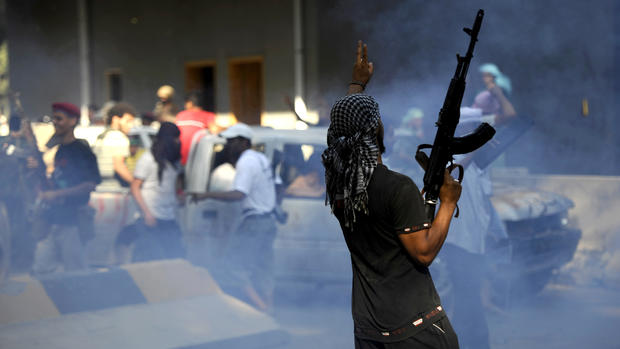Qaddafi "erratic," so next moves hard to figure
With Libyan strongman Muammar Qaddafi's grip on power apparently crumbling, his whereabouts were unknown Monday - and trying to figure out what he'll do next is complicated by his "erratic" nature, according to a journalist and author who's interviewed him.
Robin Wright, who's covered the Middle East for years and whose latest book, "Rock the Casbah: Rage and Rebellion Across the Islamic World" was published in July, told "Early Show" co-anchor Erica Hill she thinks, "We've had a real turning point in the last 24 hours, in terms of Qaddafi's future, with the arrest of his son Saif. He is the most important of the three sons who've been found. He was the key political adviser to his father. He was the one who navigated Qaddafi's return to the international community. And Qaddafi will be relying now on Khamis, his fourth son, who is the leader of a critical military unit.
Libya rebels rejoice, but "tall order" remains
"But in terms of negotiating a surrender or a transition, Saif's absence will be very important. Qaddafi is so erratic, so quirky, so prone to rages, that trying to figure out exactly how he could navigate his way out of this, or negotiate his way out of this, is almost impossible."
Wright says Qaddafi's days as Libya's leader are over. "Libya," she says, "is a very tribal society, (with) over 140 tribes and clans, and there are three, particularly, who have been critical to his survival. ... And he will be hoping that there will be a strong enough tribal support for him, somewhere, to save his life. I think that's unrealistic at this point. With the takeover of most of Tripoli now, it's clear his era has ended."
The Libyan rebels still have their work cut out for them, though, Wright adds, saying, "There are kind of three parts of Libya that have been fighting on separate fronts, but the two most important are ... the Transitional National Council, which has run its own militia out of Benghazi in the east. And then there's the western front, which has made the most progress in moving into Tripoli.
"And these are forces that need to be brought together. They've kind of dealt with each other indirectly, tried to coordinate more in recent weeks, but this is a country that has deep divisions, it's not a natural creation, and so there are tough times ahead, and everyone who has fought will want to have a sense of their rewards, both in terms of the political and economic spoils."

